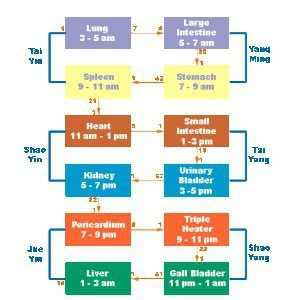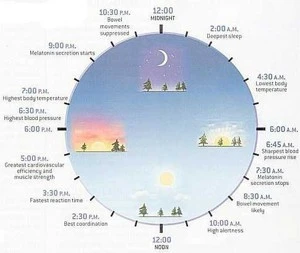Circadian Rhythms, the Chinese Clock and How To Live in Sync
Our bodies have a number of processes that happen at regular intervals throughout the day. We respond to light and dark, hot and cold, and other natural polarities - in effect "yin and yang". Through spending less time in natural environments, working long hours, eating at odd hours and all of the other less natural behaviors we conduct we may disrupt these processes. Western medicine uses the term "circadian rhythms" to describe these processes and the changes that happen internally in response to our environment. While researchers do not yet understand all of the rhythms and their effects, we are beginning to explore the relationship between disruptions in these rhythms and the development of illness. More obvious issues that arise such as jet lag are well known, but psychological issues, digestive problems, insomnia and fatigue among others may be related as well. Chinese Medicine uses the theory of the Chinese clock to describe a similar set of activities that happen on a daily basis and also effect our health. This article is going to explore both of these systems looking for similarities as well as tools we can use to help us live more in sync with our natural environment.
What Is A Circadian Rhythm?Circadian rhythms describe regular events that happen to all humans, plants and animals on a daily basis. We are far from understanding all of them and their effects on our health but we know that there are processes that happen in all of us on a roughly 24 hour cycle influenced by various cues from our environment. The influence of these rhythms can change sleep and wake cycles, release various hormones, influence body temperature and regulate other important bodily functions. While we all have circadian rhythms there are some differences in the length of the cycles which helps to explain why some of us are "night owls" and others are "morning people". There also appears to be a genetic component to our rhythms which explains why some lifestyle habits such as staying up late appear to run in families.
The image below shows many of the circadian rhythms:
From the image we can see regular changes in melatonin secretion, body temperature, vascular changes and bowel changes among others. For example, melatonin secretion starts around 9pm and ceases around 7:30am with our period of deepest sleep at 2am. This sets in place a natural sleep cycle for us as humans. For those of us who work late hours or third shift we are in direct contention with this natural cycle and this may lead to issues with sleep or other aspects of our health.
We also see that our lowest body temperature is at 4:30am and our highest is at 7pm. This natural temperature variation allows for many processes in our body to function correctly, yet our temperature controlled environments may not always cater to allowing these functions to completely take place. This, again, is another example of possible disruptions.
What Are Some Causes of Disruptions In Our Internal Clock?Besides obvious disruptions such as flying across the international date line, the majority of the disruptions to our internal clock are related to a less natural environment and various lifestyle habits. Many of us know the joys of going camping - the fresh air, the cool streams, etc. What is interesting about camping, particularly after a few days, is how you begin going to sleep a few hours after sundown and wake up right around sunrise. At home we have lights, tv's, computers, stores that are open 24 hours and more to keep us stimulated and busy much later than we would in a natural setting. It should come as no surprise that this would have an impact on us.
The circadian rhythms are controlled by our body's master clock or what is known as the suprachiasmatic nucleus (SCN). Using sleep as an example, our master clock receives information from the optic nerves about how much light is outside. As the SCN receives information that there is less light the brain is triggered to produce more melatonin so you can sleep. This is one of many reasons why people with trouble sleeping should not watch TV or use the computer before trying to go to sleep as they are too bright and too stimulating.
While we can and will adjust to various disruptions as we do with jet lag we cannot contend against this natural balance constantly. Jet lag resolves as we respond to a new environment by meshing with the new cycle of day and night. This is entirely different, however, from staying up until 3am for 3 nights out of the week and then going to bed at 9pm the other 4 nights. These types of disruptions, if constant, are the type that may lead to illness.
What Conditions May Result From These Disruptions?Issues such as alcohol abuse, poor sleep, insomnia, depression, seasonal affective disorder (SAD) and bipolar disorder have ties to disruptions in the circadian rhythms. And some medications, herbal formulas and even acupuncture itself may be beneficial in part due to regulating the abnormal circadian rhythms. Just like the interplay between yin and yang in Chinese Medicine, disruptions in the circadian rhythms (called "phase shifts" or "phase delays" in western research) can have wide spread complex effects on the body that are still being explored.
How Does Chinese Medicine Describe These Rhythms (or "What Is The Chinese Clock")?Chinese medicine contains a full pool of information based on observations of interactions with our environment over thousands of years. Much as each meridian system has a corresponding season, color, emotion and other related connections (see five element theory), so does each 24 hour period. As with the circadian rhythms of the west, the meridians follow natural periods of heightened activity and of relative rest. Observing and respecting this rhythm allows our body to function more efficiently and to defend against illness.
The following chart shows all of the meridians and their periods of strongest activity:

From this chart we see many correlations with daily activities that can influence our health. 7-9am is when our stomach system is most active making it a good time for breakfast. We see that the liver is most active between 1-3am which is a common time for people to wake with liver related insomnia issues (see "My Liver is What?"). The kidney system, which is the root of our overall energy, is most active between 5-7pm (see "My Kidneys are What?") a good time for exercise. The pericardium system is most active from 7-9pm which is a good time to start relaxing and unwinding from the day. Imbalances within this system result in anxiety, nausea, and/or insomnia.
What Correlations Do We See Between West and East?Both the Chinese clock and the circadian rhythms serve in part as reminders that we are in fact human and we are related to our environment in deep ways. As much as light and electricity have allowed us to do many fantastic things, these changes do not come without challenges to our natural systems. While we shouldn't be unplugging everything just yet, we do need to have an appreciation for our natural relationships and be aware that challenging these may well cause health problems. Working with our environment is by most accounts a very easy way to improve our health and psychological wellbeing without medications, treatments, or other mechanisms.
How Does This Knowledge Effect Treatment Options?With regards to the circadian rhythms the master clock (or SCN from above) is controlled by the hypothalamus. Within the Tam Healing System that I primarily utilize we use GV 22 to help regulate these functions. This in combination with other points may have deeper systemic effects by balancing the broad range of changes controlled by this system. Researchers are also looking at independent circadian rhythms found in organs and cells outside of the control of the SCN such as those in the lungs, liver, spleen and skin. This means that the natural relationships defined by Chinese medicine such as the lungs being related to the expression of grief, for example, may eventually be "proven" by research into these rhythms. And living more in accord with our environment may have much lead to much broader changes that we may think.
Chinese medicine uses the Chinese clock to help diagnose and treat various issues. Someone who wakes between 1-3am rather than 3-5am tell us the liver system is likely related to their insomnia as opposed to the lung meridian. Digestive problems that are worse between 7-9pm may indicate a weak stomach system as that is when its control is at its weakest point. The clock is also used by some practitioners to choose which points to use based on what time the patient is coming into the office. Certainly an awareness and respect for these relationships is important for successful treatment.
tag @yinyanghouse for questions/comments
